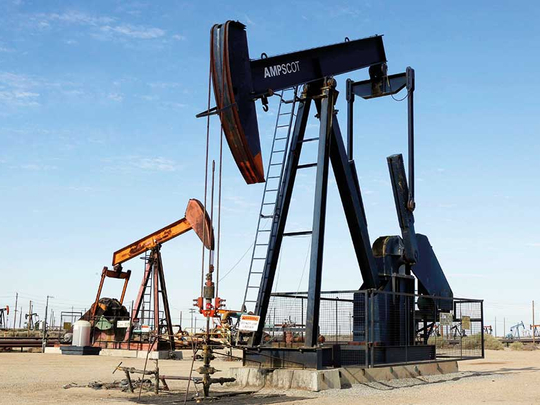
Hong Kong: Oil held its slide into a bear market amid speculation rising US output will blunt Opec-led efforts to trim a global glut.
Futures were little changed in New York after sinking below $43 (Dh158) a barrel. US oil production increased to the highest since August 2015, according to a report from the Energy Information Administration. Crude and gasoline stockpiles declined last week. Brent in London closed Wednesday more than 20 per cent below its January peak, also entering a bear market.
Oil in New York has retreated to a 10-month low amid concerns that rising global supply will offset production cuts from the Organisation of Petroleum Exporting Countries and its partners including Russia. Opec members are in talks about making further curbs to supply, but reaching a consensus will be difficult, according to the Iranian oil minister.
“There is just too much oil in the market,” Fereidun Fesharaki, founder and chairman of energy industry consultant FGE, said in a Bloomberg Television interview, adding that a further 700,000 barrels a day needs to be trimmed from the market to boost prices. “Opec cannot wait. They have to cut the production to lift the prices to $50. If they don’t do it, the bear market will push the prices even below $40 a barrel.”
West Texas Intermediate for August delivery was at $42.55 a barrel on the New York Mercantile Exchange, up 2 cents, at 1:32pm in Hong Kong. Total volume traded was about 4 per cent below the 100-day average. Front-month prices on Wednesday fell to $42.53, the lowest close since August.
Brent for August settlement was unchanged at $44.82 a barrel on the London-based ICE Futures Europe exchange. Prices lost $1.20 on Wednesday to close at the lowest since Nov. 14. The global benchmark crude traded at a premium of $2.27 to WTI.
US oil production rose by 20,000 barrels a day last week to 9.35 million, the EIA reported Wednesday. While crude stockpiles slid by 2.45 million barrels to 509.1 million, more than forecast in a Bloomberg survey, inventories remain about 100 million barrels above the five-year average.












